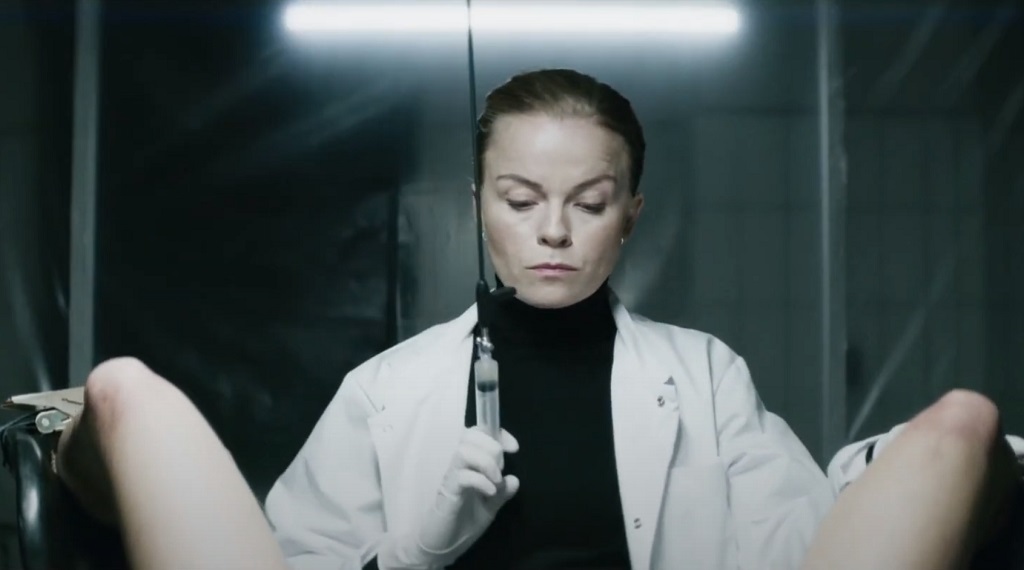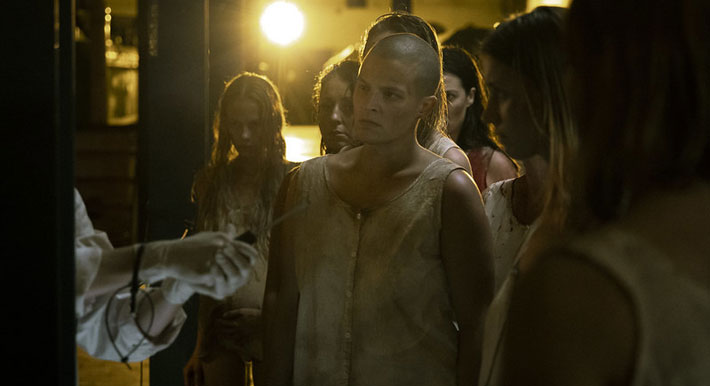Disturbing ‘Breeder’ Makes a Powerful Argument for Reproductive Rights [Review]

Breeder is not for the faint of heart. The Danish film from director Jens Dahl and writer Sissel Dalsgaard Thomsen follows the nefarious Dr. Ruben (Signe Egholm Olsen), a woman obsessed with reversing the aging process for her wealthy male clients. Her research involves kidnapping and impregnating women, then using the stem cells she harvests from the births. Though investor Thomas (Anders Heinrichsen) has misgivings about her methods, he’s willing to look the other way until his wife Mia (Sara Hjort Ditlevsen) becomes one of the subjects. Finally deciding to act, he attempts to help his wife escape Dr. Ruben’s factory basement of horrors. But first, they must battle her psychopathic henchmen, the Pig (Jens Andersen) and the Dog (Morten Holst), along with the doctor herself who will stop at nothing to protect the promise of wealth, esteem, and immortality.
Devastating and cruel, Breeder is a rough watch and will likely be triggering for survivors of sexual assault, abortion, miscarriage, and the struggle to conceive. But through the atrocities Breeder depicts, Dahl makes a powerful statement about the importance of reproductive freedom and the lengths women must go for bodily autonomy.
Related: ‘Piggy’ Is A Groundbreaking Effort, Even When It Gets Caught In The Mud [Sundance 2022]
Breeder is not subtle and Dahl does not pull any punches. The atrocities these women suffer are horrific. Brutal depictions of physical assault, bondage, torture, and rape are hard to stomach, as are images of crude birth and discarded bodies. But Dahl is honest in depicting the realities of birth and conception. He doesn’t shy away from telling the truth even though it may be upsetting to watch. While carefully riding the line between portrayal and exploitation, Breeder is likely to be controversial and will definitely rub some viewers the wrong way. But one might argue that it is our patriarchal society actually exploiting women. Dahl is merely shining a bright light on a horrific reality and refusing to look away from the excruciating details.
However brutal his imagery, Dahl should also be praised for his unvarnished depiction of more healthy aspects of the female experience, namely breastfeeding and kink. Nursing is presented as a natural bodily function rather than an offensive act to be performed in secret shame. While many scenes revolve around the Dog’s violent misogyny, Breeder also contains a scene of female masturbation and hints of consensual BDSM. It’s a nuanced look at sex noting that it’s not the often taboo acts themselves that are the problem, but the intention behind them. There is a world of difference between consensual bondage designed for pleasure and restraint for the purpose of torture and control.
Related: ‘Master’ Explores The Scary Realities of Academia [Sundance 2022]
Breeder’s most obvious social commentary lies in its depiction of the physical and emotional harm caused by forcing women to carry unwanted pregnancies to term. The women kept captive in Dr. Ruben’s basement are reduced to their wombs, literally referred to as ovaries that can be bought and sold. They wait in cages and watch their bellies grow larger, preparing for a birth that may end up costing them their lives. Though an imperfect metaphor, the torture these women endure as they prepare to give birth can be equated with the experience of watching your body change by carrying an unwanted pregnancy for 40 weeks. Helpless to stop the transformative process, the relentless clock ticks toward a birth that will plunge the mother into an unknown future.

In a more overt metaphor, Breeder reveals the hypocrisy in the so-called pro-life movement, arguing that it is merely pro-birth. Dr. Ruben cares not for the children she is creating. She rips them away from their mothers minutes after birth and casts them aside as soon as their cellular purpose has been fulfilled. She forces these births because they allow her to amass her own personal power and wealth. Here she is similar to politicians who pass laws stripping away bodily autonomy designed to limit women’s options and keep them in positions of subservience. A prisoner to their wombs, women without access to reproductive care are denied accommodations that would empower them to live lives of their own choosing.
Related: ‘Hatching’ Is A Monstrous Coming-of-Age Horror For The Digital Age [Sundance 2022]
Though the Pig and the Dog represent misogynistic men more than willing to reap the benefits of an oppressive system, the film’s more insidious villain is Dr. Ruben. She has sold out her gender for the power that comes from upholding the dominance of men. She is creating drugs that reverse the aging process thus allowing these billionaires to hold onto the wealth and authority they’ve amassed on the backs of others. They will reign in perpetuity, never cycling out of society through generational change. She is assisting them in maintaining their stranglehold on the rest of civilization by allowing them to subvert the only true societal equalizer: time.
Dr. Ruben is an extreme example of a particular type of woman found in every powerful aspect of society; a crucial cog in the wheel of gender-based oppression. Having internalized the belief that she will never be worthy of power equal to that of a man, she attempts to climb as high on the patriarchal ladder as possible by making herself valuable to men. Dr. Ruben’s research is also a mirror of western medicine, developed with a white cisgender male in mind and only occasionally interested in studying other types of bodies.
The only woman she seeks to help is herself, searching for a way to extend female life so that she, too, can benefit from her wonder drug. This insidious goal reveals her understanding of the oppressive hierarchy she feeds. Knowing that society values women based on their youth and vitality, she seeks to extend her window of usefulness and desirability for as long as possible.
Related: Rebecca Hall Elevates Frightening Psychodrama ‘Resurrection’ [Sundance 2022]
And what of Thomas? While his intentions are arguably good, he supports a system he knows to be exploitative. He’s been looking the other way and failed to inquire about practices he feels uncomfortable with because they benefit him personally. He represents all the men who bemoan the loss of reproductive rights knowing their own bodies are safe. Only when Dr. Ruben’s experiments threaten someone he loves is Thomas motivated to act. Though Mia is a relatable protagonist, her rescue highlights an unfortunate truth.
So often oppressive systems are allowed to continue in the shadows. They’re only exposed when a member of the wealthy or powerful class is affected. Conversely, Thomas’s turn could be used as an object lesson for the importance of powerful people using their privilege to protect those who do not have any. He is a controversial figure in the film, but one we see every day in reality.
Though Breeder reveals many devastating truths, its power lies in Dah’s unflinching but compassionate depiction of the women at its core. Held in dehumanizing conditions, they suffer horrific torture. They are treated as mindless vessels to create children, an echo of recent statements made on the floor of the US Congress in another attempt to overturn Roe v Wade.
Related: ‘Watcher’ is A Bone-Chilling Paranoid Thriller [Sundance 2022]
A blunt comparison at the beginning of the film shows a horse in a stall, kept in confinement and brought out to fulfill his master’s intentions regardless of his own will. But another comparison could be made to the immigrants and refugees held in cages at the US border. Separated from their children, many women have been denied medical care including abortions that would force them to carry unwanted pregnancies to term. Considered less than human because of where they were born, they are quickly discarded when their existence becomes inconvenient for the dominant culture.

Breeder’s conclusion is both brutal and cathartic, filled with affecting imagery and moving cinematic moments. But it is also representative of reality. We won’t topple the patriarchy within our lifetimes and sometimes the victories only serve to reveal more pain. Breeder’s final act is simultaneously empowering and a cruel reminder that one villain’s defeat will not erase centuries of oppression. It’s not enough to simply remove the oppressors from power; we must confront the system that allowed the oppression to continue unchallenged. Dahl also effectively shows the lingering trauma caused by prolonged abuse and sexual assault. Though the abuser may be gone, the pain remains. It’s only in supporting each other that collective healing is possible. While Breeder is certain to be controversial, it is a heart-wrenching and terrifying film made all the more powerful because of its haunting plausibility and echoes of the society we currently live in.
